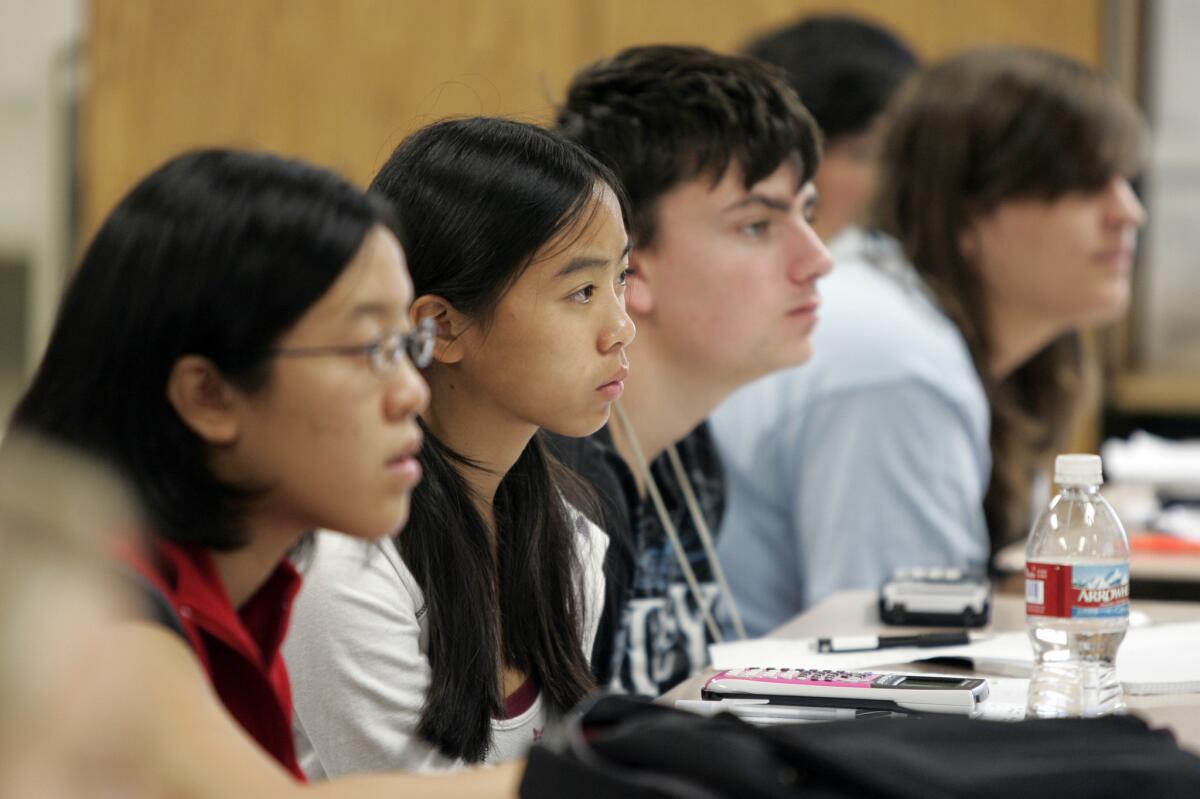Study examines achievement gap between Asian American, white students

- Share via
A growing achievement gap between Asian American students and their white classmates is due largely to greater work effort and cultural attitudes, not innate cognitive ability, researchers say.
In a study published Monday in the journal PNAS, two sociology professors found that Asian Americans enter school with no clear academic edge over whites, but that an advantage grows over time.
Even if they come from poorer, less educated families, Asian Americans significantly outperform white students by fifth grade, authors wrote.
“What accounts for Asians’ greater academic effort than whites?” asked study authors Amy Hsin of Queens College in New York and Yu Xie of the University of Michigan.
“Asian and Asian American youth are harder working because of cultural beliefs that emphasize the strong connection between effort and achievement,” the authors wrote. “Studies show that Asian and Asian American students tend to view cognitive abilities as qualities that can be developed through effort, whereas white Americans tend to view cognitive abilities as qualities that are inborn.”
However, the study authors say the high performance of Asian American students comes at a cost.
“Studies show that Asian American youth are less psychologically adjusted and socially engaged in school than their white peers. They may experience more conflict in relationships with parents because of the high educational expectations their parents place on them,” authors wrote.
The researchers based their conclusions on a review of standardized test scores, teacher evaluations, immigration status, socio-demographic factors and grade point average.
The information included two national longitudinal studies. One of them followed 1,368 white and 244 Asian students from kindergarten through eighth grade, while the other followed 2,787 white and 745 Asian high school sophomores for two years.
Prior studies have found that Asian Americans get higher grades and score higher on standardized test scores when compared to white students. They are also more likely to finish high school and attend college.
Previous explanations for this phenomenon have included family socio-demographic characteristics, natural cognitive skills and academic effort.
The authors wrote that family wealth was not a factor in performance.
“The poverty rates of Chinese and Vietnamese are higher than they are for whites. However the disadvantaged children of Chinese and Vietnamese immigrant families routinely surpass the educational attainment of their native-born, middle-class white peers.”
Similarly, there was no convincing evidence that the reason was genetic. While Asian Americans might test higher than whites in cognitive ability around age 2, that edge eroded by the time the children entered school, authors wrote.
The answer, the authors wrote, appeared to be a matter of motivation and work ethic.
“Qualities such as attentiveness, self-control, motivation and persistence may be as important as cognitive abilities in positively affecting academic performance,” the authors wrote. “Asian American parents may engage in parenting practices that better cultivate these qualities that, in turn, enable their children’s academic success.”
The authors note that Asian immigrants are a self-selecting group that may be more optimistic and motivated to accept challenges and view education as the key to social and economic mobility. But they also said that Asian and Asian-American parents were more authoritarian and less permissive than white American families.
Researchers divided Asian Americans into four different groups: East Asians, Filipinos, Southeast Asians and South Asians. All groups outperformed whites, they wrote, and there was no difference between male and female students.
Asian American students scored lower than whites in terms of positive feelings toward themselves, and spent less time with friends compared to white peers.
“Asian Americans continue to occupy a complicated position in a racially stratified United States,” the study authors wrote. “They are simultaneously recognized for their work ethic and intelligence and marginalized for seeming less patriotic and civically engaged. Their ‘outsider’ status may undercut their achievement success and prevent their full integration into American society.”
[For the Record, 4:42 p.m. PDT May 5: An earlier version of this story misspelled the name of study author Amy Hsin.]







